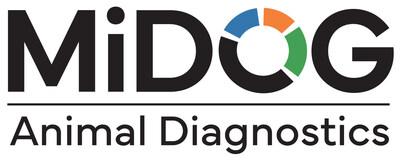
TUSTIN, Calif., Oct. 8, 2025 /PRNewswire/ — MiDOG Animal Diagnostics has released its first set of parasite reference genomes for companion animals and wildlife, publicly available through the National Center for Biotechnology Information (NCBI). This milestone extends MiDOG’s DNA-based diagnostics beyond bacteria, viruses, and fungi, addressing a critical gap in animal health: parasites.
Eukaryotic parasites affect a wide range of domestic, zoo, and wild animals causing intestinal and neurological disorders. “Over 20% of dogs and cats in the U.S. are infected with intestinal parasites, many with recurrent disease,” said Mark Yacoub, PhD, Microbiome Scientist at MiDOG. These organisms pose a significant zoonotic threat, with more than 200 species known to infect humans, especially since pets are part of the family. Parasites are traditionally identified by their morphological appearance or limited PCR panels, and genomic resources for accurate detection, identification, and prediction about the effectiveness of drugs remain scarce. Already, the overuse of anthelmintic drugs has led to increased drug resistance. MiDOG’s work bridges this gap by providing genomic references to diagnose parasites, detect antibiotic resistances, reduce diagnostic errors, and guide veterinarian for treatment options.
“Our mission is to transform veterinary diagnostics by empowering clinicians with the tools and insights they need to treat patients effectively and ultimately save animal lives,” said Janina Krumbeck, PhD, CEO of MiDOG.
To date, MiDOG has contributed a large share of high-quality publicly available parasite genomes. At this time, 50% of thorny-headed worm parasite genomes and 12% of flatworm parasite genomes available on NCBI were provided by the MiDOG team, thus strengthening global databases and filling key knowledge gaps. These references are daily applied in real-world cases helping veterinarians to solve their cases, such as Cryptosporidium serpentis in endangered snakes, Neodermophthirus harkemai in aquarium-housed lemon sharks, Cystoisospora in the endangered black-footed ferrets, and the first genomic detection of Tritrichomonas foetus in a family dog.
These novel genomes further empower public health efforts by tracking tropical and emerging parasites in non-endemic regions, such as the U.S. They also advance One Health initiatives by linking parasite genetics with hosts, vectors, geographic spread, and co-occurring pathogens.
Over the past year, MiDOG partnered with the Harold W. Manter Laboratory of Parasitology (HWML) in Lincoln Nebraska, one of the world’s largest parasite collections. Many of these specimens were derived from NSF-sponsored fieldwork since 1986, including samples from the U.S., Bolivia, Mexico, and throughout the Neotropics. By combining MiDOG’s sequencing with HWML’s long-term parasite archives, the collaboration ensures genetic databases are both technically robust and scientifically grounded. “The collaboration with MiDOG has already resulted in several novel parasite genomes with annotations now hosted on NCBI,” Dr. Scott Gardner at HWML noted. “As public trust resources, these specimens must be accessible to qualified researchers, which has been achieved through this collaboration. We look forward to continuing the collaboration to expand the genomic databases even further.”
The scientist team at MiDOG is currently accepting other parasites relevant to veterinary medicine for whole genome sequencing as well.
About MiDOG Animal Diagnostics
MiDOG provides advanced DNA-based testing of infectious diseases for veterinarians and researchers, delivering precise microbial and parasite detection to improve infectious disease diagnostics, treatment, and animal health worldwide. MiDOG enables an integrated approach to animal diagnostics, allowing the study of eukaryotic parasites within the microbiome, revealing cross-kingdom interactions, and monitoring treatment effects across the entire microbial community. Clinically actionable results can be generated within hours.
More info about the MiDOG diagnostic services can be found at www.midogtest.com.
Genome Links from Partnership with HWML
- Neoctenotaenia variabilis (rabbit tapeworm) Neoctenotaenia variabilis isolate NP-1874, whole genome shotgun sequen – Nucleotide – NCBI Neoctenotaenia variabilis genome assembly ASM5198912v1 – NCBI
- Ctenotaenia marmotae (marmot tapeworm) Ctenotaenia marmotae isolate HWML-67656, whole genome shotgun sequenci – Nucleotide – NCBI Ctenotaenia marmotae genome assembly ASM5198913v1 – NCBI
- Mesocestoides sp. (deer mouse worm) Mesocestoides sp. HWML-68667, whole genome shotgun sequencing project – Nucleotide – NCBI Mesocestoides sp. HWML-68667 genome assembly ASM5198902v1 – NCBI
- Metroliasthes lucida (turkey tapeworm) Metroliasthes lucida isolate NP-200, whole genome shotgun sequencing p – Nucleotide – NCBI Metroliasthes lucida genome assembly ASM5198895v1 – NCBI
- Atriotaenia procyonis (racoon worm) Atriotaenia procyonis isolate NP-2600, whole genome shotgun sequencing – Nucleotide – NCBI
- Syphacia peromysci (deer mouse roundworm) Syphacia peromysci isolate NP-1055, whole genome shotgun sequencing pr – Nucleotide – NCBI
- More currently pending.
For more information, please read our block by clicking the link below:
Media Contact
Kay Seremwe, Marketing Manager
MiDOG Animal Diagnostics
[email protected]
View original content to download multimedia:https://www.prnewswire.com/news-releases/hunting-parasites-to-save-animal-lives—from-the-deep-sea-to-the-family-dog-midog-expands-veterinary-genomics-with-first-set-of-parasite-reference-genomes-in-collaboration-with-the-university-of-nebraskas-harold-w-manter-labor-302577918.html
SOURCE MiDOG Animal Diagnostics





